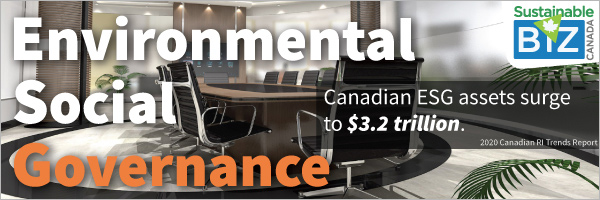Recent Articles
Ivanhoé, Hines secure record $780M CIBC SQUARE green loan
Ivanhoé, Hines secure $780M green construction loan
Ivanhoé Cambridge and Hines have secured the largest green construction loan in Canadian market history, $780 million, to finance construction of phase II of the massive CIBC Square development at 141 Bay Street in the heart of Toronto’s downtown financial district.
Federal gov’t selects TD for 1st green bonds issuance
• Cision
The Government of Canada’s Department of Finance has selected the Toronto-Dominion Bank for its inaugural issuance of green bonds. TD Securities will advise on the design of Canada’s green bond framework and support an inaugural issuance in the coming year.
CEOs urge G7 to adopt policies to reach net zero
The Alliance of CEO Climate Leaders has called on G7 members and other world leaders, for the second time in 2021, to adopt policies that will help their companies halve emissions by 2030 and reach a net-zero state by 2050.
Time for mass timber to take centre stage
Developer Ian Gillespie of Westbank wants to make mass timber tower construction a standard rather than a novelty, starting with a 21-storey residential rental tower in Vancouver. He purchased the site as part of a campus of buildings called Main Alley.
Food crops flourish at Toronto office tower
Shiri Rosenberg, the director of asset strategy at Colliers Real Estate Management Services in Toronto, is passionate about reimagining commercial spaces in our urban landscape. Rosenberg is helping to lead the charge with Colliers Edible and Pollinator Garden program.
 |
Sponsored by Streamlining the path to sustainability using LEED v4.1 |
Fifteen years ago, I started EcoAmmo with the belief that every building has the potential to make a positive impact on the environment, the health of its occupants, and the teams who design and build them. But transitioning buildings toward
BIPV solar panel market growing
Building-integrated photovoltaics (BIPVs) are not typical solar panels. Compared to traditional solar panels, which are attached to buildings, BIPVs are built into exteriors as key elements. BIPVs generate clean energy, defend against the elements, and save money on building materials.
ISP will make smart building envelopes
A Toronto architect sees a bright future for a strong but lightweight Intelligent Structural Panel (ISP) that can be used in place of traditional structural elements such as reinforced concrete and steel decking. It is safe, fast, and efficient.
New York passes low-carbon concrete bill
New York has passed Bill S542A establishing guidelines for the procurement of low-embodied carbon concrete. Concrete remains a critical barrier to climate-friendly buildings and is responsible for at least 7 per cent of carbon emissions worldwide according to BloombergNEF.
Ottawa’s 275 Slater receives LEED Platinum V4.1
• GlobeNewswire • Sustainable Biz Canada
Colonnade BridgePort and LaSalle Investment Management announced that Green Building Council Inc. awarded the LEED Platinum v4.1 Certification for Operations and Maintenance to 275 Slater Street. Committed to sustainability, 275 Slater has reduced its energy and water consumption by 7 and 16 per cent, respectively.
Task force studies Canada’s residential flood insurance
The Task Force on Flood Insurance and Relocation is submitting flood insurance models to an actuarial sciences team that will study them, said Matthew Godsoe, director of the resilience and economics integration division at Public Safety Canada.
B.C. tech innovation helps drive cities of tomorrow
UBC’s Renewable Energy Hub aims to turn a city-sized block into a smart energy district, basically turning buildings into giant rechargeable batteries. Besides providing zero-emission vehicles with clean, renewable power, a local innovation could help cities run better.
Federal gov’t invests in Hamilton-based clean auto hub
• Cision
The integration of advanced technology across the automotive and aerospace sectors is transforming the way we travel and transport goods, while offering substantial environmental benefits by reducing emissions and moving us closer to a zero-emissions future.
The green lure of Sweden’s industrial far north
Long home to polluting industries, the hydro and wind power of Sweden’s far north is set to reduce the country’s carbon footprint as it lures low-emission manufacturers and creates thousands of jobs for those willing to brave the cold.
Decommissioned wind turbine blades create problems
As the world ramps up renewable energy deployments, the materials, manufacturing processes, and disposal methods for clean technologies are creating their own issues. In the U.S. alone, about 8,000 wind turbine blades need to be removed this year.
Federal policy restricting thermal coal threatens Vista
• CBC
The federal government makes developing thermal coal in Canada more difficult with a new policy that says such mines create “unacceptable environmental effects.” The move threatens Coalspur Mines’ Vista mine expansion in Alberta, the only such mine currently in Canada.
Manulife aims to reduce GHG by 80%, 2050
• Cision
As a leading global real estate asset manager, Manulife Investment Management has the ability to help lead the transition to a low-carbon economy. The company is focusing on driving sustainable real estate and reducing GHG emissions by 80 per cent by 2050.
Carbon offset prices set to increase tenfold by 2030
• GreenBiz
The cost of offsetting corporate carbon emissions is expected to surge tenfold over the next decade as growing numbers of businesses adopt net-zero targets, with carbon credit prices tipped to reach between $20 and $50 a metric ton of CO2 by 2030.
Welcome to the era of regenerative finance
While few funders have fully realized the regenerative finance vision, a growing community of financial activists is applying its core practices in initiatives demonstrating how we can use capital as a tool to create healthy and equitable environmental systems.
How circular thinking could ease inflation
• GreenBiz
The success of activist strategies to press corporate boardrooms on climate, the success of SPACs, and the trillions of dollars flowing into clean energy and infrastructure are a sign that the market’s time horizon on climate issues is moving up.
 Industry Events
Industry Events
-
Canada Green Building Council: Building Lasting Change 2024
Jun 05 2024
to Jun 06 2024
Toronto
-
Global Conference on Renewable Energy and Environmental Sustainability
Aug 16 2024
to Aug 18 2024
Vancouver, Canada











